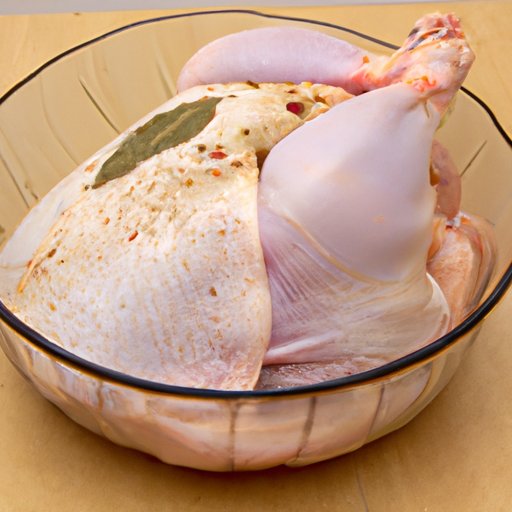I. Introduction
Marinating chicken is a simple and effective way to enhance the flavor and texture of this popular meat. With the right marinade and technique, chicken can become juicy, tender, and bursting with delicious flavors. Whether you’re a seasoned cook or a beginner, this guide will provide you with all the information you need to create the perfect marinade.
II. How to Marinate Chicken: A Step-by-Step Guide
The first step in marinating chicken is choosing the right marinade. This can be anything from a simple combination of oil, vinegar, and herbs to a more complex mixture of spices, citrus, and yogurt. Once you have your marinade, it’s time to prep the chicken. Trim off any excess fat or skin and make sure the chicken is dry before adding it to the marinade.
Next, place the chicken in a sealable plastic bag or a shallow dish and pour the marinade over it. Make sure the marinade coats the chicken evenly and massage it into the meat to ensure maximum absorption. Refrigerate the chicken for at least 30 minutes, but ideally, you should marinate chicken for at least 4 hours, or even overnight for more intense flavor.
When you’re ready to cook the chicken, remove it from the marinade and discard the remaining liquid. Pat the chicken dry and cook it according to your preferred method. If you’re grilling the chicken, baste it with some reserved marinade to intensify the flavors.
Here’s a simple recipe for a classic lemon-herb marinade:
- 1/3 cup olive oil
- 1/4 cup lemon juice
- 2 cloves garlic, minced
- 1 tablespoon chopped fresh thyme
- 1 tablespoon chopped fresh rosemary
Whisk all the ingredients together and pour over the chicken. Refrigerate for at least 30 minutes before cooking.
III. Quick and Easy Chicken Marinades for Busy Weeknights
For busy weeknights, quick and easy marinades are the way to go. These simple yet tasty marinades can be whipped up in minutes and add plenty of flavor to your chicken. Try a teriyaki marinade made with soy sauce, brown sugar, garlic, and ginger, or a simple honey mustard marinade made with dijon mustard, honey, and apple cider vinegar.
Pair these marinades with easy side dishes like roasted vegetables or rice for a complete meal. Planning ahead and marinating chicken in batches can save you time throughout the week.
IV. Unlocking the Flavors of the World: Global Chicken Marinades to Try
For a taste of different cultures, try out some global marinades for your chicken. Jerk marinade from Jamaica is made with allspice, ginger, thyme, and habanero peppers, while tandoori marinade from India is made with yogurt, ginger, turmeric, and paprika.
Experiment with these unique flavors by using them in stir-fry dishes, on the grill, or in slow-cooker recipes. Here’s a tandoori marinade recipe to get you started:
- 1 cup plain yogurt
- 2 tablespoons lemon juice
- 2 cloves garlic, minced
- 1 tablespoon grated fresh ginger
- 1 tablespoon ground cumin
- 2 teaspoons paprika
- 1 teaspoon turmeric
- 1/2 teaspoon cayenne pepper
Blend all the ingredients together and pour over the chicken. Refrigerate for at least 2 hours before cooking.
V. Beyond the Basics: Creative Chicken Marinades to Change Up Your Routine
If you’re looking to switch up your routine, try out some creative chicken marinades. A Thai peanut marinade made with peanut butter, coconut milk, and lime juice is a delicious and unexpected option. A spicy harissa marinade made with red peppers, garlic, and cumin adds a bold and smoky flavor to your chicken.
These marinades can be used in different ways, such as in wraps, salads, or as part of a taco bowl. Here’s a recipe for a simple harissa marinade:
- 1/2 cup roasted red peppers
- 2 cloves garlic, minced
- 1 tablespoon olive oil
- 1 tablespoon tomato paste
- 1 teaspoon ground cumin
- 1 teaspoon smoked paprika
- 1/4 teaspoon cayenne pepper
Blend all the ingredients together and pour over the chicken. Refrigerate for at least 1 hour before cooking.
VI. The Science of Marinating Chicken: How Marinades Work and How to Use Them
Marinating chicken isn’t just about adding flavor; it’s also about the science behind it. The acid in the marinade breaks down the proteins in the chicken, which makes it more tender. The oil in the marinade helps to protect the chicken from drying out during cooking.
For best results, use different acids for different types of meat. For example, vinegar is best for lean meats like chicken breast, while citrus fruits like lemon and lime work better for fattier cuts of meat like chicken thighs. To maximize flavor absorption, use complementary spices and seasonings in the marinade.
It’s also a good idea to set aside a portion of the marinade for basting during cooking. This will add an extra layer of flavor to the chicken and help to keep it moist. Finally, make sure to refrigerate the chicken during marination to prevent bacterial growth.
VII. Conclusion
Marinating chicken is an easy and fun way to add flavor and tenderness to your meals. Whether you’re sticking to classic recipes or experimenting with new flavors, marinating chicken is sure to enhance your cooking.
